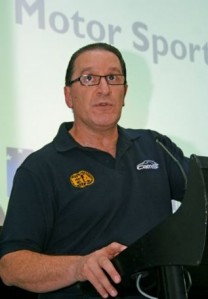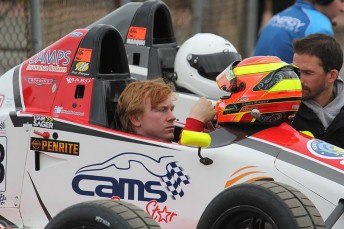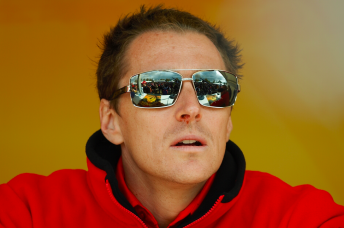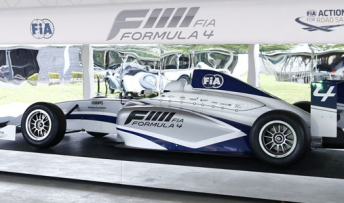

Having struggled to keep its head above water in recent years, the Australian Formula Ford Championship will be no more in 2014.
Speedcafe.com’s Stefan Bartholomaeus spoke to CAMS CEO Eugene Arocca about the end-of-an-era and the way forward for Australian open-wheel racing.
SPEEDCAFE: Eugene, yesterday’s announcement caught a few people by surprise, but would you suggest that the writing had been on the wall for quite a while?
EUGENE AROCCA: I think that’s a fair comment. We have really inherited the category from Formula Ford management, who had struggled to make ends meet financially at the start of 2013.
We didn’t want to let the teams and drivers down by simply letting it fold, so we stepped into the breach to manage it for 2013.
We were able to pull in some favours and get some assistance from V8s and for the TV, but we were still running it at a loss. One of the key drivers had been that Ford had withdrawn some support that it had previously provided. The loss of that support made it very hard for us to see it as a long term future.
We managed it for 2013, but it’s an expensive entry to open-wheel, and it wasn’t that hard a decision to discontinue it. We were getting pressure from competitors and teams to make a call, so we made the decision that it wasn’t something we could support going forward.

SPEEDCAFE: Is CAMS holding one of its own CMAs (category management agreements) ever an equilibrium state?
AROCCA: We’re a regulator, but we also have a responsibility to promote the development of the sport, so from time to time we need to take control and assist in certain categories, particularly when they’re seen as development categories.
While it’s not the preferred case, the fact is that no one put their hand up when Margaret Hardy had indicated that she was going to struggle for 2013.
The motorsport industry has a lot of networks and at no stage did anyone come forward with any proposal to assist us with or to takeover the running of Formula Ford nationally.
It wasn’t our preferred course to step in, but we had to in order to protect the interest of those who put a lot of love and money into the sport.
We did it for 2013, but we certainly couldn’t do it again (for 2014). It’s taken the time of the CEO, the chief of motorsport… we’ve had a full-time staff member managing it. The fact is we’ve lost money and we just can’t be doing that.
The fundamental problem is that it’s an expensive entry level for open-wheelers. Those who come from karts and go straight into open-wheelers, the cost virtually doubles. When you’re looking at a national championship where people are spending $200,000 to compete, you’ve got to take a deep breath.
I think motorsport is evolving and we want to be sure that the evolution is measured, but we just couldn’t see a future for Formula Ford as a national championship.

SPEEDCAFE: It’s continuing at a state level, as you’ve announced. Are there changes to the technical formula required for that to continue to thrive, or are those costs not the problem?
AROCCA: I think at state level it is very well managed and sustainable. The Formula Ford Association is doing a very good job, from what I’ve heard, with strong grids. That’s one of the more encouraging parts of Formula Ford, that at state level it is sustainable and engaging.
The problem is the translation into a national competition. We’re a big country and it costs a lot of money to transport everything that makes up a team around for a national championship.
We’re absolutely behind the state competition and if someone was to come to us with a proposal to manage a festival or some form of national series of Formula Ford, we would certainly look at it. But what we see is a major leap in costs from state to national level.
When you’ve got mums and dads struggling to get their cars on the grid at $70,000 or $80,000 a year and others are investing $250,000, it’s probably time for people to take a deep breath and look at the longer term picture.

SPEEDCAFE: The announcement on Tuesday was titled ‘finding the right formula’. There’s a clear void that Formula Ford will leave now at a national level. How do we go about the process of replacing it?
AROCCA: There is certainly a void in terms of an introductory open-wheel category, but I don’t think it’s necessarily produced the number of champions we’d love to have at an international level.
The FIA has made it very clear that they want to invest in affordable, entry level categories that feed towards the top level. We’ve got an obligation to the government, who fund us and give us money for driver development, and we’ve got an obligation to our members to ensure that we look at promoting the young drivers of Australia to compete at the international level.
Certainly if there are some drivers that can compete in V8s (V8 Supercars) that’s all good and well, but the reality is that motorsport needs participation at the highest levels and Formula Ford isn’t exactly what you’d call a natural feeder towards Formula 1.
For that reason, this is an opportunity for us. We’ve just appointed Cameron McConville as our driver development manager, and have entrusted him with coming up with a plan to support and develop a formula for the development of drivers that feeds into international success.
To directly answer your question, we’re reviewing everything and it’s an evolutionary process.
SPEEDCAFE: Is it a fair assumption to suggest that Cameron will be working closely with the FIA on finding the way forward?
AROCCA: He’s starting next Monday and he has the opportunity to gather as much information and intelligence about the best way to develop our young drivers at an international level.
He’s conducting the FIA Regional Academy for CAMS in October at Eastern Creek, which is obviously an academy that’s FIA-endorsed and feeds into the European series, and he’s also going to be in charge of our own academy.
Cameron is going to be spending six to eight weeks finding as much information out as he can to get CAMS a real road map forward for driver development.
He’s already been overseas and seen what the academy is doing and he’s already got some great ideas. He’s also going to be talking to the AMSF (Australian Motor Sport Foundation) which is obviously a very important part of our development, and come up with a strategy that I think all Australian motorsport enthusiast can embrace as a way forward for our young talent.
Developing the Daniel Ricciardos and Mark Webbers of the world can’t just rely on luck. A lot of those stories are of luck and good fortune, and we want to make sure that we actually provide a pathway that’s based on raw talent.
SPEEDCAFE: The FIA’s Single Seater commission president Gerhard Berger has made it clear that he wants to see Formula 4 established between karts and Formula 3 from 2014. Is it premature for us to be asking specifically about whether that is a possibility here?
AROCCA: It is premature. The FIA has made it very clear that Formula 4 is something they want to encourage. They are talking to ASNs and where possible assisting those ASNs to explore the introduction of Formula 4.
We didn’t make the decision about Formula Ford based on any preconceived idea on what we are going to do with Formula 4. That is still in a very much development stage. The board hasn’t considered it, there has been no decision. But it’s certainly something that, as an internationally recognised ASN, we need to ensure that Daniel Ricciardo isn’t going to be the last Formula 1 driver that we produce.
We want to strive to ensure that if Formula 4 is an opportunity that we should look at, we will look at it.
Certainly the FIA is very keen for the Asia Pacific region to have a Formula 4 engagement and we just need to make sure that we tick all the boxes before we go down that path.
SPEEDCAFE: What are we looking at in terms of timelines here? Is it possible to have another class up and running for 2014?
AROCCA: That’s a good question but I just can’t make a call on that. As I’ve said regularly around the country, we’re going through an evolutionary stage, and I don’t think you can rush into things without properly analysing their flow-on effect.
If Formula 4 is going to happen in Australia it could happen in ’14, it could happen in ’15, or it may not happen at all.
CAMS has a responsibility to investigate it, to consider it, and to carefully plan for it so that we don’t create a road to nowhere.
I must say that I’ve been contacted by a number of people who are excited about what could happen with Formula 4, but we’re just simply saying ‘cool your jets, stay calm, we’ll work through it and we’ll find an option that’s worth considering, and then report back to our members and make a decision accordingly.
I’ve only been in the sport as an administrator for nine months but I think there’s an air of excitement with Cameron McConville’s appointment and with CAMS being upfront about driver development and the opportunity to put talent on the grid. I think motorsport enthusiasts should be very excited about the future.


















